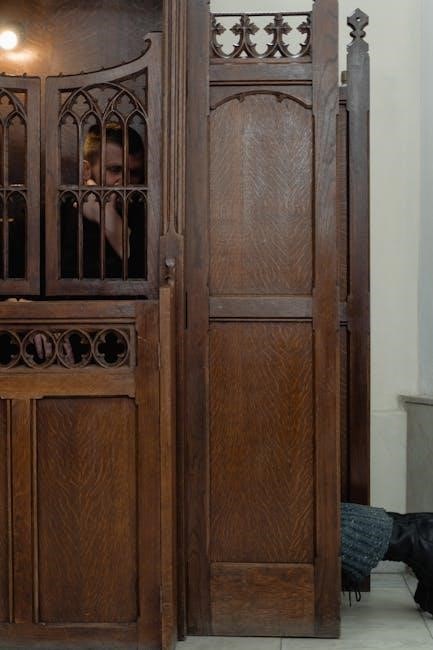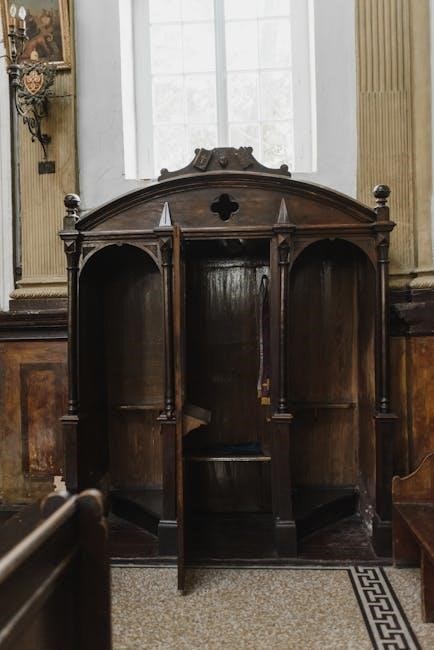Catholic confession is a sacrament where believers seek forgiveness for their sins through prayer and penance. It strengthens faith‚ promotes spiritual renewal‚ and fosters reconciliation with God and the Church.
What is Catholic Confession?
Catholic confession‚ also known as the Sacrament of Reconciliation‚ is a ritual where individuals confess their sins to a priest. It involves an examination of conscience‚ acknowledging wrongdoing‚ expressing remorse‚ and receiving absolution. The process fosters spiritual healing and strengthens one’s relationship with God. Confession is rooted in biblical teachings and Church tradition‚ emphasizing God’s mercy and forgiveness. It is not merely a human act but a divine encounter‚ where the priest acts as Christ’s representative. Regular confession is encouraged to cultivate humility‚ self-awareness‚ and moral growth. Through this sacrament‚ believers seek pardon and grace to live a virtuous life‚ aligning with Christ’s teachings of love and redemption.
The Purpose of Confession in Catholicism
The purpose of confession in Catholicism is to reconcile individuals with God‚ themselves‚ and the Church community. It provides an opportunity for spiritual cleansing‚ healing‚ and growth. Through confession‚ believers acknowledge their sins‚ take responsibility for them‚ and receive forgiveness. This sacrament strengthens faith‚ restores grace‚ and helps individuals avoid future sin. It also fosters humility‚ self-reflection‚ and a deeper understanding of God’s mercy. Confession is not just about listing sins but about transforming one’s life through repentance and divine pardon. By participating in this sacrament‚ Catholics experience renewal and are empowered to live according to Christ’s teachings‚ fostering a stronger spiritual life and a closer relationship with God.
The Benefits of Regular Confession
Regular confession offers numerous spiritual and emotional benefits‚ fostering a deeper connection with God and personal growth. It provides clarity of conscience‚ freeing individuals from guilt and shame‚ and helps them recognize patterns of sin. Through confession‚ Catholics receive graces to overcome weaknesses and grow in holiness. It also strengthens their commitment to living a virtuous life and deepens their understanding of God’s mercy. Regular confession promotes accountability‚ humility‚ and self-awareness‚ essential for spiritual development. Additionally‚ it restores peace of mind and heart‚ enabling believers to approach life with renewed hope and joy. By confessing regularly‚ Catholics experience ongoing conversion and a more profound union with Christ and His Church.
Preparing for Confession
Preparing for confession involves self-reflection‚ prayer‚ and recalling past sins. It helps individuals acknowledge their faults‚ seek forgiveness‚ and grow spiritually before receiving the sacrament.
How to Examine Your Conscience
Examining your conscience involves reflecting on your thoughts‚ words‚ and actions to identify sins. Start by praying for guidance‚ then review your life since your last confession. Consider the Ten Commandments‚ the Beatitudes‚ and virtues like love‚ kindness‚ and honesty. Be honest with yourself about any wrongdoing‚ including omissions and intentions. Note specific instances where you may have failed morally. This introspection helps you take responsibility and seek forgiveness. Writing down your sins can clarify your thoughts and ensure a thorough confession. Remember‚ humility and sincerity are key to a meaningful examination of conscience. This process is essential for spiritual growth and reconciliation with God.
Reflecting on Your Sins
Reflecting on your sins involves acknowledging and understanding their impact on your relationship with God and others. Begin by praying for self-awareness and honesty. Consider how your actions‚ inactions‚ or intentions may have caused harm. Examine specific situations where you may have fallen short of living according to God’s will. This reflection should lead to genuine remorse and a desire to change. Be specific about the sins you have committed‚ taking responsibility for them without excuses. Remember‚ confession is not just about listing faults but seeking forgiveness and healing. This process prepares you to receive God’s mercy and grace‚ fostering spiritual renewal and a deeper commitment to living virtuously.
Prayer Before Confession
Prayer before confession is essential to prepare your heart and mind. Begin by asking the Holy Spirit for guidance and humility. Use prayers like the Act of Contrition or Psalm 51 to express remorse. Reflect on your intentions and seek genuine forgiveness. Prayer helps you acknowledge your sins‚ take responsibility‚ and renew your commitment to following God’s will. It also invites grace to strengthen you against future temptations. Remember‚ prayer is not just a ritual but a heartfelt conversation with God‚ expressing sorrow and resolve to change. This spiritual preparation is crucial for a fruitful confession‚ ensuring you approach the sacrament with openness and sincerity.

The Confession Process
The confession process involves entering the confessional‚ greeting the priest‚ and expressing your intention to confess. The priest guides you through the sacrament‚ offering advice and penance.
Step-by-Step Guide to Confession

Enter the confessional and greet the priest.
Begin with the sign of the cross‚ saying‚ “Bless me‚ Father‚ for I have sinned.”
State the length of time since your last confession.
Confess your sins honestly and fully‚ without omitting serious ones;
Listen to the priest’s advice and receive your penance.
Pray the Act of Contrition‚ expressing genuine sorrow for your sins.
Receive absolution from the priest‚ who grants forgiveness in God’s name.
Perform your penance as instructed‚ often prayers or good works.
This structured approach ensures a meaningful and fruitful sacramental experience‚ fostering spiritual renewal and reconciliation with God.
What to Say in the Confessional
When entering the confessional‚ begin with a respectful greeting and the sign of the cross. Say‚ “Bless me‚ Father‚ for I have sinned.” Mention how long it has been since your last confession. Confess your sins clearly‚ focusing on serious ones without unnecessary details. The priest may offer advice or assign a penance. Conclude by praying the Act of Contrition sincerely‚ expressing regret for your sins. After receiving absolution‚ thank the priest and fulfill your penance. Remember to approach with humility and sincerity‚ seeking forgiveness and spiritual growth.
Understanding the Sacramental Absolution
Sacramental absolution is the culmination of the confession process‚ where the priest‚ acting in persona Christi‚ imparts God’s forgiveness to the penitent. Through the sacramental words‚ the priest exercises the authority given by Christ to forgive sins. The formula of absolution is a sacred act that restores the individual’s relationship with God and the Church. It is not merely a human gesture but a divine gift mediated through the priest. The absolution lifts the spiritual burden of sin‚ offering reconciliation and peace. This sacramental act emphasizes God’s infinite mercy and the Church’s role as a channel of grace. Regular reception of absolution fosters spiritual renewal and a deeper connection with God’s love. It is a profound expression of God’s forgiveness and healing grace.

Prayers for Confession
Prayers for confession guide individuals in seeking forgiveness and reconciliation. They include traditional Catholic prayers that help prepare the heart‚ express sorrow‚ and seek absolution‚ deepening the sacrament’s grace.
The Act of Contrition Prayer
The Act of Contrition is a prayer expressing sorrow for sins and a commitment to amendment. It is typically recited during confession‚ acknowledging wrongdoing‚ expressing regret‚ and seeking forgiveness. The prayer begins with acknowledging sins before God and the Church‚ followed by a resolve to avoid sin and love God. It is a heartfelt expression of repentance‚ essential for receiving sacramental absolution. Many Catholics memorize this prayer to recite during confession‚ emphasizing contrition and the desire for spiritual growth. Its words reflect the Catholic belief in God’s mercy and the sacrament’s power to reconcile individuals with God and the Church. Regular use fosters a deeper understanding of sin and the importance of seeking forgiveness.

Other Relevant Prayers for Confession
Besides the Act of Contrition‚ several other prayers are often used to prepare for or reflect on confession. The Rosary can help examine one’s conscience‚ while the Hail Mary expresses repentance and seeks intercession. The Stations of the Cross meditate on Christ’s suffering‚ fostering compassion and sorrow for sin. Additionally‚ the Kyrie Eleison (“Lord‚ Have Mercy”) is a simple yet powerful prayer for mercy. Many also pray the Prayer to the Holy Spirit‚ seeking guidance and strength to avoid sin. Finally‚ the Our Father is often recited‚ emphasizing forgiveness and reconciliation. These prayers enrich the confession experience‚ deepening contrition and resolve to live virtuously. They complement the Act of Contrition‚ enhancing spiritual preparation and renewal.

Catholic Teachings on Confession
Catholic teachings emphasize confession as a sacrament of reconciliation‚ offering forgiveness for sins through divine mercy and sacramental grace‚ fostering spiritual renewal and a closer relationship with God.
The Church’s View on Confession
The Catholic Church views confession as a sacred sacrament of reconciliation‚ through which believers seek forgiveness for their sins. Rooted in scripture‚ the Church teaches that Christ entrusted the apostles with the power to forgive sins (John 20:21-23). Confession is seen as a means to reconcile with God and the Church community‚ restoring spiritual harmony. The Church emphasizes the importance of contrition‚ sincere repentance‚ and the intention to amend one’s life. It also highlights the role of the priest as a mediator of God’s mercy‚ offering absolution and spiritual guidance. Regular confession is encouraged‚ even for venial sins‚ to foster spiritual growth and deepen one’s relationship with Christ. The Church’s teachings underscore confession as a gift of divine mercy and a pathway to holiness.
Confession and the Sacrament of Reconciliation
Confession is an integral part of the Sacrament of Reconciliation‚ through which Catholics seek forgiveness for their sins and restore their relationship with God and the Church. This sacrament‚ also known as Penance‚ involves three key elements: contrition (sorrow for sin)‚ confession (verbal acknowledgment of sins to a priest)‚ and satisfaction (performing penance to make amends). The Church teaches that through this sacrament‚ Christ reconciles sinners to Himself and to the Church‚ healing spiritual wounds and strengthening the believer’s union with God. The sacrament is rooted in Jesus’ words to the apostles‚ “If you forgive the sins of any‚ they are forgiven” (John 20:23)‚ emphasizing the priest’s role as a mediator of God’s mercy. Regular participation in this sacrament fosters spiritual growth and deepens one’s commitment to living a virtuous life.

Frequently Asked Questions
Frequently Asked Questions about Catholic Confession address common concerns‚ such as how often to attend‚ what to do if sins are forgotten‚ and understanding the process.
How Often Should You Go to Confession?
The frequency of confession varies depending on individual circumstances. The Catholic Church recommends confessing at least once a year‚ typically during Lent‚ to fulfill the Easter duty. However‚ for those striving to grow in holiness‚ monthly confession is encouraged. This regular practice helps deepen self-awareness‚ fosters a closer relationship with God‚ and strengthens moral resolve. Ultimately‚ the decision to go to confession should be guided by a sincere examination of conscience and the desire to seek forgiveness and spiritual growth. Even if no serious sins are present‚ confession is beneficial for nurturing humility and experiencing God’s mercy.
What if You Forget Your Sins During Confession?
Forgetting sins during confession is a common experience and not a cause for alarm. The Church teaches that forgetting does not invalidate the sacrament‚ as long as the person has made a sincere effort to recall their sins. If you later remember something you forgot‚ mention it in your next confession. God’s mercy is not limited by our memory. Additionally‚ praying after confession‚ such as the Prayer to St. Joseph or the Act of Contrition‚ can help seek forgiveness for overlooked sins. The key is to approach confession with honesty and humility‚ trusting in God’s grace and forgiveness.

Printable Confession Guide
A printable confession guide offers a structured checklist to prepare for the sacrament‚ including prayers‚ reflection prompts‚ and step-by-step guidance to ensure a meaningful and organized experience.
Creating a Personal Confession Checklist
A personal confession checklist helps individuals systematically prepare for the sacrament. Start with prayer for guidance and self-reflection. List specific sins‚ focusing on their nature and frequency. Reflect on how these sins have affected relationships with God and others. Consider areas of life needing improvement‚ such as thoughts‚ words‚ and actions. Understand the purpose of confession as a means of reconciliation and spiritual growth. Finally‚ resolve to amend your life and express sincere contrition. This structured approach ensures a meaningful and thorough confession‚ fostering accountability and deeper faith.
Printable Prayer Cards for Confession
Printable prayer cards for confession are a wonderful resource to deepen your spiritual preparation. These cards often include essential prayers like the Act of Contrition‚ Hail Mary‚ and prayers for forgiveness. They can be customized to fit personal needs‚ such as adding specific intentions or reflections. Many cards feature beautiful artwork or scripture verses to inspire mindfulness. They are especially helpful for those who struggle to remember prayers during confession. Printable cards can be laminated for durability or kept in a prayer journal. They serve as a thoughtful reminder to pray for guidance before‚ during‚ and after confession. Using these cards fosters a more intentional and grace-filled experience‚ helping you approach the sacrament with sincerity and devotion.

Additional Resources
Explore books‚ online guides‚ and printable worksheets for a deeper understanding of Catholic confession. These resources offer practical advice and spiritual enrichment for your faith journey.
Books on Catholic Confession

Several books provide deep insights into the sacrament of confession‚ offering theological understanding and practical advice. Titles like The Forgiveness of Sins by Scott Hahn and Confession: A Little Book for the Reluctant by Fr. Timothy Gallagher explore the biblical roots and spiritual benefits of confession. These books guide individuals in examining their consciences‚ understanding sin‚ and fostering a deeper relationship with God. They also address common struggles and misconceptions about the sacrament‚ making them invaluable for both new and experienced Catholics. Additionally‚ classic works like The Confessions of St. Augustine offer personal reflections on sin‚ repentance‚ and divine mercy. These resources enrich one’s preparation for confession and encourage a more meaningful spiritual life.
Online Guides and Worksheets
Online guides and worksheets are excellent resources for preparing for confession. Websites like Catholic.org and EWTN offer downloadable confession guides tailored for adults and children. These resources often include step-by-step instructions‚ prayer prompts‚ and reflection questions to help individuals examine their consciences. Printable confession worksheets are particularly useful for identifying sins‚ fostering accountability‚ and deepening spiritual growth. Many guides also provide tips for making a fruitful confession‚ such as how to express sorrow and commit to amendment. These tools are accessible‚ practical‚ and adaptable to personal needs‚ making them a valuable complement to traditional prayer books and spiritual direction. They empower Catholics to approach confession with clarity and confidence‚ enhancing their sacramental experience.
Regular confession fosters spiritual growth‚ healing‚ and renewal‚ drawing believers closer to God. Embrace this sacrament to experience peace‚ grace‚ and a deeper connection with Christ.
The Importance of Regular Confession
Regular confession is a vital practice in Catholic spirituality‚ fostering a deeper relationship with God and strengthening moral awareness. It helps believers recognize sin‚ seek forgiveness‚ and grow in holiness. By confessing regularly‚ individuals experience spiritual clarity‚ peace‚ and renewed purpose. This sacrament also promotes accountability and humility‚ essential for spiritual growth. The Church encourages frequent confession‚ even for venial sins‚ to cultivate a habit of self-reflection and reconciliation. Through regular confession‚ Catholics can better understand God’s mercy and live a life aligned with His will. It is a powerful tool for spiritual renewal and a meaningful way to deepen one’s faith journey.
Encouragement for Spiritual Growth
Embracing regular confession is a powerful way to nurture spiritual growth and deepen your relationship with God. This sacrament offers a profound opportunity for self-reflection‚ healing‚ and renewal. By confessing your sins‚ you open yourself to God’s grace‚ which strengthens your resolve to live a virtuous life. Regular confession helps you identify areas for improvement‚ fostering humility and compassion. It also reminds you of God’s infinite mercy‚ encouraging you to approach life with hope and gratitude. Through this sacrament‚ you are empowered to overcome sin and grow closer to Christ. Let confession be a cornerstone of your spiritual journey‚ guiding you toward a life of greater love‚ peace‚ and holiness.